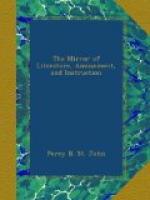Now in this version it naturally occurs to inquire what righteousness? The high churchman will content himself that it is a literal translation; but the way-faring man sees nothing of the atoning righteousness of Christ in this translation; but which according to the 11th article of the Church of England, he reasonably looks for. Even the Unitarians refer to this and other parts of our translation of the Hebrew Psalms, as a justification of their main principle of the unity alone in the godhead.
Dr. Watts, a genuine Christian, believing in the union of the Father, Son, and Spirit, and manifesting this pure faith to the end of a well-spent life, gives the Christian meaning of this righteousness, in his version of the 4th Psalm:
Know that the Lord divides his Saints
From all the tribes of men beside,
He hears the cry of penitents
For the dear sake of Christ who died.
Here the true typical and prophetic meaning of the Old Testament is given.
The version used by the English church in the 5th Psalm is subject to the same observation as on the 4th.
The church version is
Thou in the morn shall hear my voice
And with the dawn of day,
To thee devoutly I look up,
To thee devoutly pray.
Dr. Watts, who gives the Christian meaning of this Psalm, translates or paraphrases thus truly:—
Lord in the morning thou shall hear My voice ascending high, To thee will I direct my pray’r, To thee lift up mine eye. Up to the hills where Christ is gone To plead for all his Saints, Presenting at his father’s throne, Our songs and our complaints.
Psalmody, or the singing of sacred music, conducted by such a gracious and animated sense of the revealed word of God, must naturally be performed, as it must be ardently felt, in a different spirit—and this truth we perceive daily verified; but while a considerable portion of our clergy not only are strict in confining the singing to the last version, or to parts of Sternhold, and even prescribe the very dull old tunes to be made use of, improvement in church music is not to be expected. I have before me a list of tunes, to which the organists of our churches and episcopal chapels are limited in their playing; and, what is singular, three of the chief clergymen of the churches confess they literally have no ear for music, and are utter strangers to what an octave means, and yet their authority decides.
It is not intended to enter into any polemical discussion, as controversy is not necessary to the improvement of psalmody; but less than has been stated would not have shown the advantage to be acquired by the use of a more Christian sense to those who rely on Christ as their Redeemer. We know, from experience, how agreeable it is to the mind and senses to hear the praises to the Almighty sung by the proper rules of harmony, and with what spiritual animation the upright and sincere youth of both sexes unite in this delightful service.




